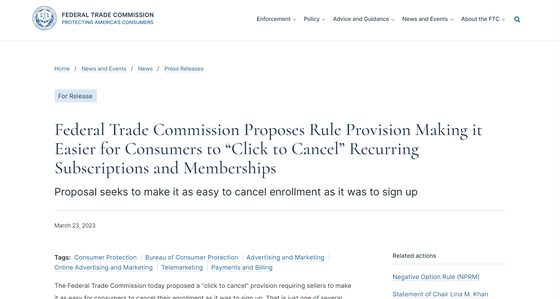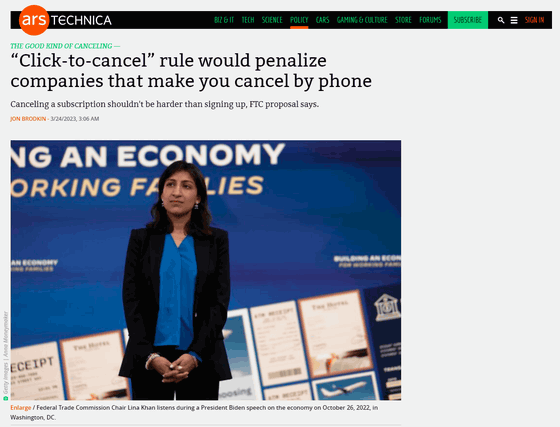The FTC aims to make ``Click to Cancel'' obligatory to cancel the subscription with a single click as ``Cancellation should be as easy as applying'', penalties for companies that complicate cancellation

The Federal Trade Commission (FTC) has proposed a regulation clause that would require ``Click to Cancel'', which allows you to cancel the service with just a click, saying that canceling a subscription service should be as easy as signing up. Did. The proposed rule clause also includes consumer refunds, which will be enforced with civil penalties.
Federal Trade Commission Proposes Rule Provision Making it Easier for Consumers to “Click to Cancel” Recurring Subscriptions and Memberships | Federal Trade Commission

“Click-to-cancel” rule would penalize companies that make you cancel by phone | Ars Technica
https://arstechnica.com/tech-policy/2023/03/click-to-cancel-rule-would-penalize-companies-that-make-you-cancel-by-phone/

The proposed rule clauses announced by the FTC this time are a review of the negative option regulations that the FTC enacted in 1973, to address issues in cases where continuous payments are required, such as subscriptions and gym memberships. It's from 'From cosmetics to newspapers to gym memberships, it will go a long way in saving consumers from the endless struggle to cancel unwanted subscription payments,' the FTC said.

The following three points are the main points of the draft rules and regulations announced this time.
・Simple cancellation method
If consumers can't easily end their subscriptions when they want, they're just a way to keep charging consumers for products they no longer want. To address this issue, the proposed rule would require merchants to make it at least as easy to cancel a subscription as it was to start the subscription. For example, if online registration is possible, it must be possible to cancel on the same website and with the same number of steps.
・Ask before adding a service
The proposed rule clause allows sellers to offer additional or modified services when a consumer attempts to cancel a subscription. However, before making such an offer, the seller is obliged to ask the consumer whether he would like to hear the offer. Of course, if the consumer chooses 'no', the cancellation procedure must be proceeded immediately.
・Reminders and confirmations
Merchants are required to provide annual reminders to consumers enrolled in negative option programs, including non-physical goods, prior to automatic renewal.
Especially for the 'simple cancellation method', there is a 'Click to Cancel' provision. In addition to the regulation that ``the seller must provide a cancellation system that is accessible on at least the same website or web app that was used to register for the service,'' the draft rule clause states that ``users can use their phone number to If you allow registration, you must at least provide a phone number and ensure that all calls to that number are answered during normal business hours.' 'It shall be used to initiate recurring charges. To satisfy the requirement of a mechanism that is at least as simple, the call charges for cancellation must not be higher than the call charges for joining.”
In other words, in the proposed rule clauses, if companies are to be able to sign up for subscriptions with a single click, they are obliged to make it possible to cancel with a single click as well.
Furthermore, the proposed rule will be enforced with civil penalties, including fines for businesses that complicate cancellations, and fines collected will be refunded to affected consumers. It will be.

“Too often, some companies trick consumers into paying for subscriptions they no longer need or didn’t have in the first place,” said FTC Chairman Rina Kern. It requires companies to be able to cancel their subscriptions as easily as they apply for them.The rule clause saves consumers time and money, and severe penalties for companies that cheat people with their subscriptions. will be subject to,” he said.
Meanwhile, Commissioner Christine Wilson, the sole objector to the publication of the proposed rule clauses, said ``potential liability could discourage consumers from adopting the negative option plans they prefer.''
Related Posts:
in Note, Posted by log1i_yk







